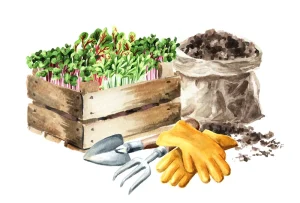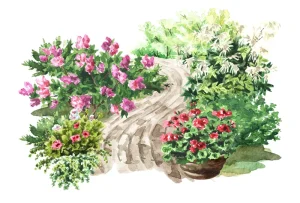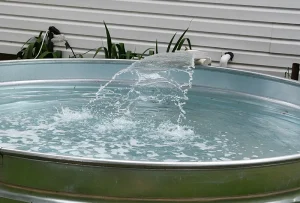compiled by Kym Byrnes
10 Summer Hacks for Your Home and Garden
I know you’ve seen the social media posts that include life-changing tips and hacks for things we do every day. To kick off summer, we gathered some outdoor tips and techniques to help you maximize these warm weather months outdoors. Learn more home and gardening tips from the University of Maryland Extension office at Extension.UMD.edu.
Create a Mosquito Bucket of Doom
Carroll County Master Gardener Linda Gray provides this suggestion for dealing with mosquitoes. She says the recent increase in homeowners paying significant sums of money to have their yards sprayed for mosquitoes is unnecessary. Gray points out that the sprays kill hundreds of beneficial insects as well as mosquitoes. “Bees are already endangered, and these sprays are deadly,” she says. “We need these beneficial insects to pollinate our flowers and veggies.” Gray provides the following steps to create a Bucket of Doom mosquito trap.
- Select a 1- to 2-gallon plastic bucket for your trap. Mosquitoes are attracted to black or red. You can find black buckets in many home goods stores.
- Place several handfuls of grass clippings or straw in the bucket and fill the bucket halfway with water.
- Place 1/4 of a Mosquito Dunk in the bucket. Dunks are available online and through many home improvement retailers. Break one dunk into four pieces, and that one piece will last about 30 days in your Bucket of Doom.
- Position the bucket near the area where you have noticed mosquito activity. If you have a large area, you may need two buckets.
- The black buckets are good at being unobtrusive in flower beds or bushes.
- The debris you’ve added to the bucket will begin to rot and attract female mosquitoes, which will lay their eggs in the bucket. The dunk will kill the larvae, and they will not hatch. About once a month, dump out the contents, rinse the bucket and refill. You must also be vigilant about emptying all spots in your yard where water collects since these areas will become breeding spots for mosquitoes.
- If you have pets that might decide to drink the water, cover the bucket with screening, but be sure it is open enough to allow mosquitoes easy access.
“I did this last summer and had one bucket near my front porch where we enjoyed sitting without getting eaten by mosquitoes,” Gray says. “It’s cheap, easy and good for our beneficial insects and bees.”
Visit the Spice Rack for Mouse Deterrents
You don’t need to look farther than your spice rack to repel mice. Reach for cinnamon or cinnamon oil. Hunker, an online home and lifestyle site, recommends tying together bundles of fresh cinnamon sticks in a pouch and leaving them at strategic locations in the house, especially where you store food. If you have cinnamon powder, tie it up in sachets or sprinkle it around.
Cinnamon oil will also do the trick. Saturate cotton balls with the oil and place them in specific areas you want to shield from mice. Besides warding off mice, you can deodorize your house — cinnamon is a natural air freshener. Besides cinnamon, peppermint, red pepper flakes and garlic powder also deter mice.
Use Ashes for Pest Control
 Carroll County Master Gardener Marty Hankins shared this hack for controlling garden pests. Wood ashes can help deter and kill some soft-bodied creatures, such as slugs, snails and cutworms. The ashes create a barrier that the pests find uncomfortable to crawl over. The high pH of the ashes can also dry out the pests’ bodies, killing them. However, don’t overdo it because wood ashes can change the pH of the soil. Learn more at CommonSenseHome.com.
Carroll County Master Gardener Marty Hankins shared this hack for controlling garden pests. Wood ashes can help deter and kill some soft-bodied creatures, such as slugs, snails and cutworms. The ashes create a barrier that the pests find uncomfortable to crawl over. The high pH of the ashes can also dry out the pests’ bodies, killing them. However, don’t overdo it because wood ashes can change the pH of the soil. Learn more at CommonSenseHome.com.
Keep the Squirrels at Bay with Spices
Multiple experts recommend using hot spices to deter squirrels from bird feeders. Consider this tip from HomesAndGardens.com.
Zack DeAngelis, the CEO and founder of Pest Pointers, says birds have difficulty tasting heat, so they don’t mind cayenne pepper. “However, squirrels will generally steer clear of cayenne pepper and any similar spice,” DeAngelis says. “You’ll want to make sure that all the birdseed is evenly coated with cayenne pepper. Just make sure to reapply after it rains.”
Alternatively, premade mixes sold with birdseed have a kick specifically to deter squirrels. Hot pepper can also help discourage other pests, including raccoons, which apparently hate the smell. Another solution is to choose bird seeds that squirrels dislike, such as safflower, niger and millet. Experts recommend that people avoid noise repellents to keep critters away since these devices can cause anxiety in animals other than squirrels, including pets.
Store Garden Tools in a Mailbox
Carroll County Master Gardener Julia Hamilton provided this handy idea for keeping garden tools accessible. Place them in a mailbox in your garden. Store your gloves, shovels, pruning shears and transplanters in the mailbox for quick and easy maintenance.
 Plant Ground Covers on a Slope
Plant Ground Covers on a Slope
Steeply sloped sections of lawn can be tricky to maintain. Due to wind and water exposure, they can be challenging to mow and erode. Retaining walls and terracing can be expensive solutions, and most plants don’t grow deep roots fast enough to control erosion. BobVila.com recommends planting ground covers like English ivy, periwinkle or dead nettle, which grow quickly and densely, making them ideal for holding the soil in place.
Deter Weeds with Newspaper
Recycling newspapers can help your garden. Instead of buying weed liners for your garden, try this tip from BobVila.com. First, douse the plot with ample water. Then, lay newspaper down around your plants on top of the weeds and wet it with the hose. This watering will prevent the newspaper from blowing away. Cover the newspaper with a few inches of mulch, and voila, enjoy your weed-free garden.
Use FlaggingTape to Track your Tomatoes
Master Gardener Linda Gray shares a hack for keeping track of tomato types in a garden. “Tie brightly colored flagging tape at the top of tomato cages and label it with the name of the variety — no more searching the ground for the label.”
Get a Jumpstart on Growing with Winter Sowing
Carroll County Master Gardener Esther Iglich says that sowing her spring veggies in the winter saves money and effort and returns excellent results. She buys bulk seeds for spring vegetables like lettuces, Swiss chard, kale, broccoli, cauliflower and spinach, and she sows them in milk jugs in January. When it’s time to transplant the young plants into the garden, they are hardened off and ready to go. She says this method is cheaper than buying market packs, and she can grow the varieties she likes. Find more winter seed-sowing articles at Extension.UMD.edu.
Stock Tank Pools: All the Rage
Maybe you think this summer is the time you’ll add a pool to the backyard until you realize it will cost tens of thousands of dollars. Think a little smaller and much more affordable, and you could find a stock tank pool that will suit your needs. A Google search can provide plenty of information and inspiration, but in a nutshell, here’s what CountryLiving.com suggests: “These inexpensive farm staples were originally designed as water troughs for livestock — it’s true. But that’s part of their country-chic appeal. Nowadays, stock tank swimming pools have been popping up in backyards across the country.”
You can find these watering troughs in varying sizes and costs at farm supply stores in our area and online. Depending on the material, the pool may have to be sealed. Place the pool on a flat surface for the best results. Fill it with water, and let the fun begin! Some choose to build an area around the pool with decking, stones and privacy walls. Some add a filter (similar to what you’d purchase for an above-ground pool) to help keep the water clean. Others opt for the lower maintenance process of draining when not in use and refilling when it’s time to swim. If you have children, be sure to monitor them, even when they’re swimming in shallow pools. Don’t forget to apply the sunscreen when they’re in the water!
With these simple hacks up your sleeve, you’ll enjoy all your fun in the sun this summer.















